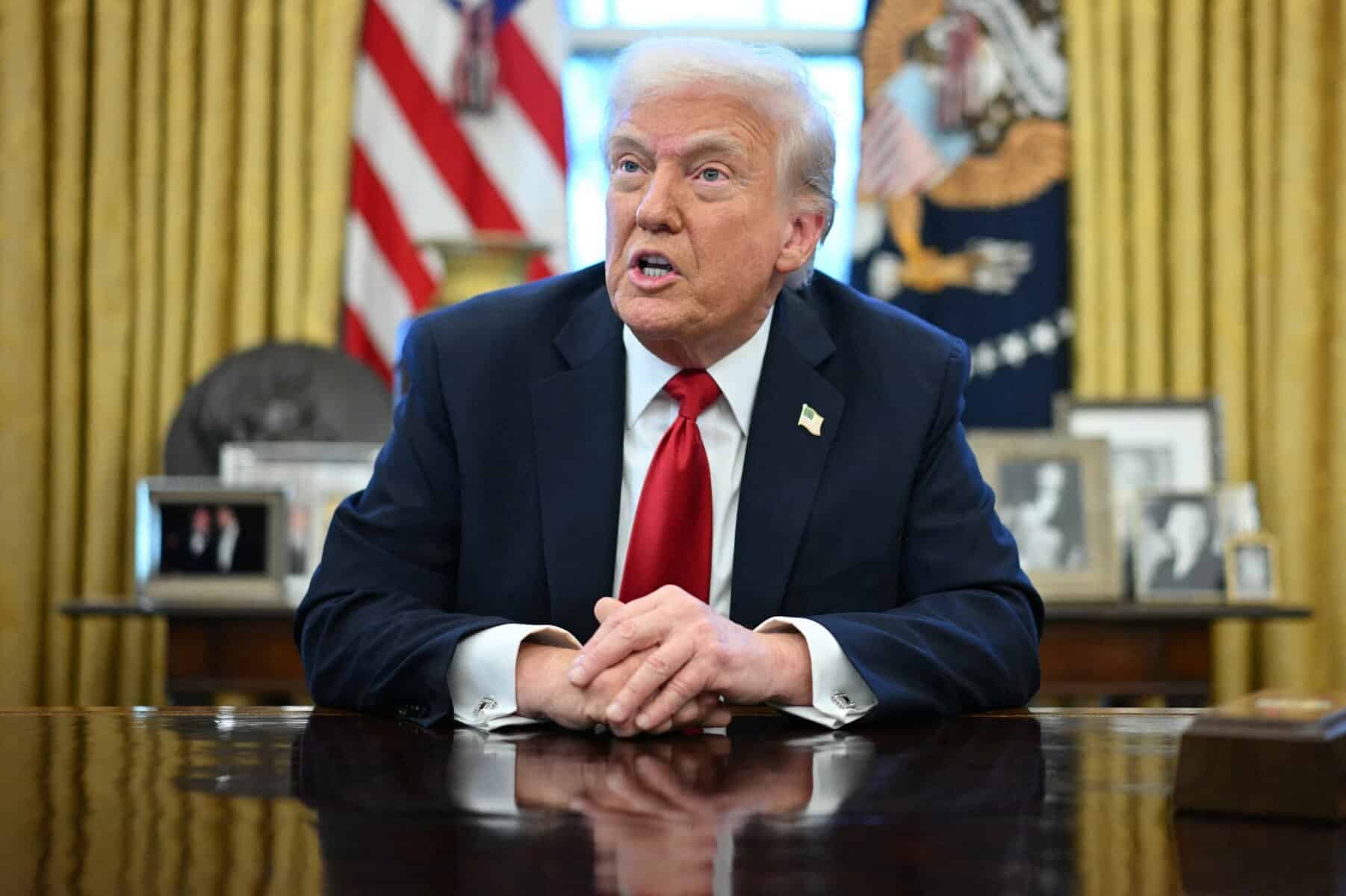With US trading partners on edge, Trump teases new tariffs, promising fairness while fueling fears of economic disruption.

US President Donald Trump in the Oval Office of the White House in Washington, DC, on March 26, 2025. (Photo by Mandel NGAN / AFP)
US trading partners scrambled Tuesday to prepare for the latest raft of Donald Trump tariffs, after the US president left unclear who would be targeted but promised to be “very kind” in addressing what he says are unfair trade imbalances.
Trump — who has been making unprecedented use of presidential powers since taking office in January — said he could announce as early as Tuesday night exactly what “reciprocal tariffs” will be imposed.
According to the Republican billionaire, the world’s biggest economy has been “ripped off by every country in the world,” and he is promising “Liberation Day” for the United States.
Asked for details, he told reporters Monday: “You’re going to see in two days, which is maybe tomorrow night or probably Wednesday.”
But he added: “We’re going to be very nice, relatively speaking, we’re going to be very kind.”
Critics warn that the strategy risks a global trade war, provoking a chain reaction of retaliation by major trading partners like China, Canada and the European Union.
ALSO READ: How will the 25% US import tariff affect SA’s auto industry?
Over the weekend, China, South Korea and Japan agreed to strengthen free trade between themselves.
But Trump said he was not worried the levies would push allies toward Beijing, adding that a deal on TikTok could also be tied to China tariffs.
White House Press Secretary Karoline Leavitt said the goal on Wednesday would be to announce “country-based tariffs,” although Trump remains committed to imposing separate, sector-specific charges.
The Wall Street Journal reported that Trump’s advisers pitched imposing a 20 percent global tariff to hit almost all US trading partners. Trump has remained vague, saying his tariffs would be “far more generous” than ones already levied against US products.
The uncertainty has jolted markets, hammering equities across the board and stoking recession fears. Asian stocks, which fell sharply Monday after Trump said his tariffs would include “all countries”, rebounded somewhat Tuesday after his promises to be “nice”.
‘Economic pain’
Trump’s fixation on tariffs is fanning US recession fears. Goldman Sachs analysts raised their 12-month recession probability from 20 percent to 35 percent.
ALSO READ: Absa foresees economic growth of 2.1%, but Trump and budget can disrupt it
This reflects a “lower growth forecast, falling confidence, and statements from White House officials indicating willingness to tolerate economic pain.” Goldman Sachs also lifted its forecast for underlying inflation at the end of 2025.
For now, IMF chief Kristalina Georgieva said Trump’s tariffs were causing anxiety, but their global economic impact should not be dramatic.
China and Canada have imposed counter-tariffs on US goods, while the EU unveiled its own measures to start mid-April.
EU chief Ursula von der Leyen said Tuesday the bloc still hopes for a “negotiated solution”, but that “all instruments are on the table” to hit back if necessary.
The EU has already been hit by several US tariff announcements since Trump returned to office in January, including a 25-percent levy on auto imports coming into force on Thursday.
Besides reciprocal country tariffs, Trump’s “Liberation Day” announcement could entail additional sector-specific levies on the likes of pharmaceuticals and semiconductors.
ALSO READ: Tariff decision delay could shutter SA’s R2.5bn roasted groundnut industry
Economists have expected the upcoming salvo could target the 15 percent of partners that have persistent trade imbalances with the United States, a group that US Treasury Secretary Scott Bessent dubbed a “Dirty 15.”
The United States has some of its biggest goods deficits with China, the EU, Mexico, Vietnam, Taiwan, Japan, South Korea, Canada and India.
‘Existential moment’
US trade partners are rushing to minimize their exposure, with reports suggesting India might lower some duties.
On Tuesday, Vietnam said it would slash duties on a range of goods including cars, liquefied gas and some agricultural products.
Japan announced it will set up around 1,000 “consultation centers” for businesses hit by US tariffs.
Speaking by phone to his US counterpart on Monday, Mexican Foreign Secretary Juan Ramon de la Fuente urged the preservation of free trade agreements between North American countries, and discussed the automobile industry, where 25 percent tariffs are poised to come into effect on April 3.
ALSO READ: Feeling sick? These are the new public healthcare fees from April
European Central Bank President Christine Lagarde said Monday that Europe should move towards economic independence, telling France Inter radio that Europe faces an “existential moment.”
Separately, British Prime Minister Keir Starmer spoke with Trump on “productive negotiations” towards a UK-US trade deal, while German Chancellor Olaf Scholz said the EU would respond firmly to Trump but was open to compromise.
It is “entirely possible” for fresh tariffs to be swiftly reduced or put on hold, said Greta Peisch, a former official at the US Trade Representative’s office.
In February, Washington paused steep levies on Mexican and Canadian imports for a month as the North American neighbors pursued negotiations.
– By: © Agence France-Presse
Download our app




